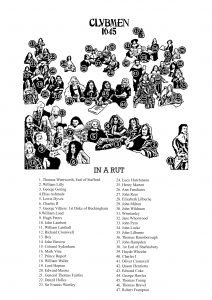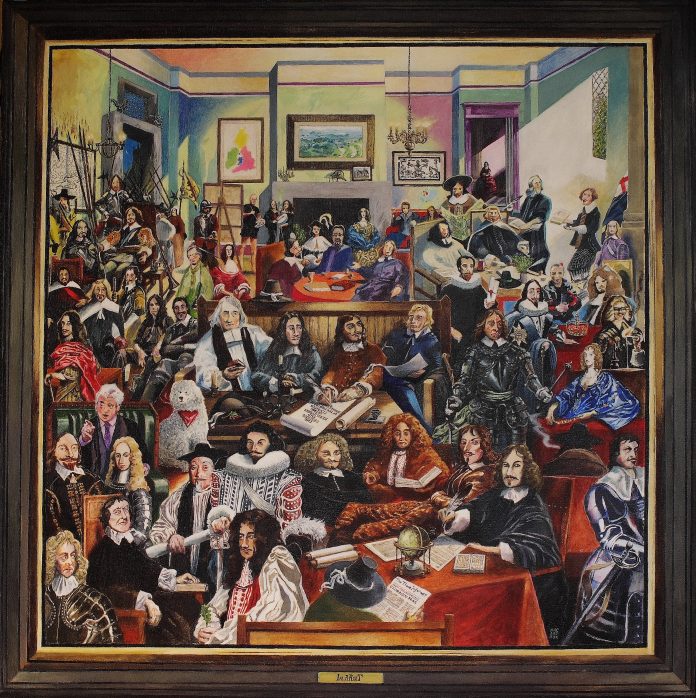Back in April of 2019 and with the anniversary of ‘The Ruts’ album The Crack in mind, we as a group, that is me, the artist Stewart MacArthur and Sheila Wiggins from Retro It Ain’t sat around the table with a new artwork in mind.
The ongoing divides put upon us as a country over the result of the 2016 referendum to leave the European Union and with the nature of our political system as of 2019 fresh in our minds, left and right at odds, divisions within. Choosing a side the question put, was now the reality. Driven by events or ideology a divide is where we are or is this a driven narrative heated by events on route? Accident, ill judged, choice, status quo preferred or opportunity? Parliament and Government at flux, functioning as intended or in need of reform.

By no means was this the main idea behind this project, but it led us into thinking of adding an element of, divides as such in keeping with the nature of the project..
For sometime we had wanted to depict the plight ‘The Clubmen’ had found themselves in by 1645, three years into a country at war with itself by some while others were placed onto that stage by the very nature of being there at that time of change. A necessity and desire for change brought to a heated political landscape by differing parties, resulting in a clash, A quiet revolution desired through dialogue, a bloody clash brought about by some of those characters involved in that revolution or conflict brought about by a pace of events and loss of trust?
The Civil War, English Revolution was for the many who as said by Clarendon were “The Third Sort, Greater in Fortune and in Number” a horror put upon them. With chaos that ensued and with the displacement of those among the generality was in the words of the time, they were now, “In A World Turned Upside Down”. Halifax, statesman, writer, and politician after the 17th century English Revolution and the man labelled a Trimmer ( a neutral who trims ones sails to suit the winds blowing) called for moderation. “Condemning the madmen of two extremes who make common sense a treason”.
‘In A Rut’ is as said part inspired by the band ‘The Ruts’ and is a line from their song ‘In A Rut’. The repetitive line from that song, “you gotta get out of it” struck a chord. What ever ones circumstances, at any given time that can be where one finds oneself ‘In A Rut’. And you gotta get out of it .
Stewart, I and Sheila discussed the idea through. Stewart had wanted to paint a picture in the theme of a room full of faces in conversation, to place this in a setting of the 17th century revolution was now a reality. This I was chuffed to hear. The three of us then sat down to decide who, where, what and nature of. Over a course of 5 months, conversations were had. Stewart added his input and with some creative licence applied worked on a setting with The Clubmen’ central to that setting.’ From those talks we got to the picture you see here.
When looking into the picture The Clubmen are as said central. What is around them is a mixture of characters, who through a series of events were instigators of, or players in a Civil War, Revolution. They found themselves caught in a succession of reaction and counter reaction. Hampden lighting the candle is an example of. From the non payment of ship money, tax as such, he played his part in where we find ourselves at the beginnings of that divide of the 17th Century. If only’s or needs to happen or just should is as ever, open to interpretation.
With the first civil war reaching a conclusion, ideas of where we wanted to be as a country abounded. This created a growing sense that we were now facing a turning point in the country, looking at itself in depth and wanting change by groups within. This is reflected in the inclusion of Lilburne for one and others. Looking at the key, one can decide on their own merits who fits what chain of thought. Company in keeping is also of note as is light and dark though the room.
With ‘The Clubmen’ we wanted to highlight the dynamics of their thinking. They were partaking in a political activism brought upon them by circumstance. Their organisation through association demanded an order in their communities. The outward demands can be seen through their declarations as an act of empowerment, beyond local parish and county lines. The community was having and demanding a say on the course of the Civil War put upon them, not decided by soldiery alone.
Haydn Wheeler, Clubmen 1645.







